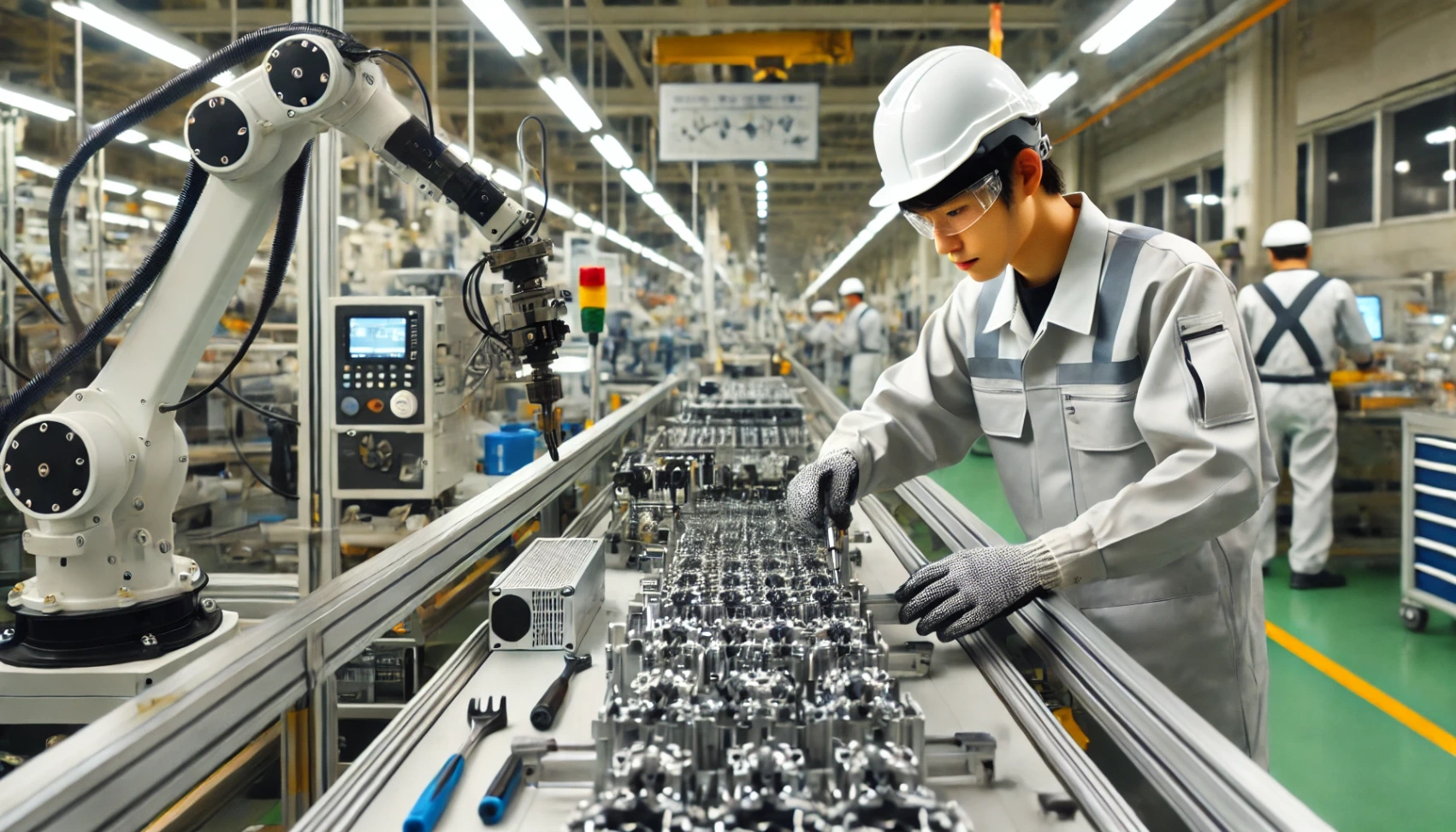Factory jobs in Japan provide steady employment with competitive wages, attracting local and foreign workers.
Many industries, including automotive, electronics, and food processing, constantly hire workers.
Knowing where to find these jobs and how to apply increases the chances of securing a position quickly.
Job Types and Requirements
Factories hire workers for various roles, from manual labor to machine operation.
Some jobs require specific skills, while others are open to beginners.
- Assembly work – Putting together parts for electronics, cars, or machinery.
- Inspection – Checking product quality, spotting defects, and ensuring compliance.
- Packaging – Wrapping, sealing, and labeling goods for distribution.
- Machine operation – Running and maintaining automated equipment.
- Forklift operation – Moving materials and finished products within the factory.
- Welding and metalwork – Fabricating metal parts and structures.
- Food processing – Handling, sorting, and packing food items.

Requirements
Factory job requirements vary by industry and role. Some accept beginners, while others need experience or certifications.
Meeting them improves job prospects and stability.
- Basic education – Most factories require at least a high school diploma or equivalent.
- Japanese language skills – Some jobs require basic Japanese, but many accept workers with little or no proficiency.
- Work visa eligibility – Foreign workers must have the correct visa, such as the Specified Skilled Worker (SSW) or Technical Intern Training Visa.
- Physical fitness – Many jobs require standing for long hours, lifting objects, or performing repetitive tasks.
- Experience and skills – Some roles, like machine operation and welding, require prior experience or certifications.
- Age requirements – Most employers prefer workers between 18 and 50, depending on the job’s physical demands.
- Willingness to work shifts – Factories often operate rotating shifts, including night and weekend work.
- Clean background check – Some employers may require police clearance, especially for long-term contracts.
- Health check – Medical examinations may be necessary to ensure workers can handle physical tasks.
- Proper documentation – A valid passport, residence card, and proof of address are usually required for job applications.
Where to Find Factory Jobs
Finding the right job requires checking multiple sources. Many companies recruit both online and offline.
- Online job portals – Websites like GaijinPot, HelloWork, and Mynavi list factory jobs.
- Recruitment agencies – Agencies help match workers with suitable employers and assist with paperwork.
- Company websites – Some factories post job openings directly on their official websites.
- Social media and networking – Facebook groups and online forums share job postings and experiences.
- Referrals – Knowing someone already employed can help secure a job faster.
- Local job centers – Government employment offices provide job listings for residents.
Application Process
A well-prepared application improves the chances of getting hired. Employers prefer clear, professional resumes.
- Resume (CV) – List work history, skills, nationality, and visa status.
- Cover letter – Some companies require a brief introduction about experience and motivation.
- Online applications – Many factories accept applications via job portals or company websites.
- Agency applications – Recruitment agencies handle applications and help with interviews.
- Photo requirement – Japanese resumes often require a professional ID-style photo.
- Visa documentation – Some companies ask for proof of legal work eligibility.

Interview and Hiring Process
Employers evaluate candidates based on work ethic, experience, and communication skills.
- Common questions – Expect questions about previous jobs, availability, and physical condition.
- Medical check – Many factories require a health examination before employment.
- Practical test – Some companies assess skills through short, hands-on tests.
- Work schedule confirmation – Be prepared to discuss shift preferences and overtime availability.
- Training period – New hires often go through a probationary or training phase.
- Hiring decision – Employers may take a few days to weeks before finalizing an offer.
Salary Expectations
Factory wages depend on experience, job type, and location. Overtime and bonuses can increase earnings.
- Entry-level positions – ¥1,100 to ¥1,400 per hour
- Skilled positions – ¥1,500 to ¥2,000 per hour for specialized roles
- Monthly salaries – Ranges from ¥180,000 to ¥300,000, depending on hours and experience
- Overtime pay – 25% to 50% more than regular hourly rates
- Night shift premiums – Extra pay for working overnight shifts
- Bonuses – Some companies offer seasonal or performance-based bonuses
Benefits and Perks
Many factory jobs provide benefits that improve job security and living conditions.
- Health insurance – Employers enroll workers in Japan’s health insurance system.
- Pension contributions – Monthly deductions contribute to the national pension system.
- Paid leave – Employees receive paid vacation days and sick leave.
- Housing support – Some companies provide dormitories or rental assistance.
- Transportation allowances – Many factories reimburse commuting costs.
- Meals and canteens – Some workplaces offer affordable meal options for employees.
- Uniforms and safety gear – Employers supply work clothing, gloves, and helmets.
Work Conditions and Challenges
Factory work can be physically demanding, but proper preparation helps workers adjust.
- Shifts and work hours – Some jobs require night shifts and weekend work.
- Standing for long hours – Many roles involve continuous standing and repetitive movements.
- Strict rules – Factories enforce discipline, punctuality, and proper conduct.
- Temperature conditions – Some factories operate in cold or hot environments.
- Workplace safety – Employers provide protective equipment and enforce safety guidelines.
Cultural Expectations and Workplace Etiquette
Understanding workplace culture improves communication and job stability.
- Punctuality – Arriving late is unacceptable in Japanese workplaces.
- Hierarchy – Employees must respect managers and follow instructions carefully.
- Teamwork – Cooperation with coworkers is essential for smooth operations.
- Workplace cleanliness – Keeping the work area clean is often required.
- Minimal breaks – Workers usually take scheduled breaks with limited personal time.
Visa Sponsorship and Legal Requirements
Foreign workers need valid visas to work legally in Japan. Employers may assist with sponsorship.
- Types of visas – Technical Intern Training Visas and Specified Skilled Worker (SSW) Visas are common.
- Employer sponsorship – Some factories sponsor visas for qualified applicants.
- Renewal and extension – Workers must renew visas before expiration to maintain legal status.
- Permanent residence options – Long-term workers may qualify for permanent residency.
Career Growth and Advancement
Factory jobs can lead to better-paying positions with experience and training.
- Promotions – Hardworking employees can move up to supervisor roles.
- Skill development – Many companies offer training for machine operation and specialized work.
- Salary increases – Experienced workers may receive raises over time.
- Shifting industries – Workers can transition from factories to other skilled labor jobs.
- Learning Japanese – Improved language skills open more career opportunities.
Tips for a Successful Job Search
Following the right approach increases the chances of securing a job.
- Prepare a strong resume – Highlight relevant work experience and skills.
- Use multiple job sources – Apply through job portals, agencies, and direct applications.
- Follow up – Contact employers after applying to show interest.
- Attend job fairs – Some companies hire directly from recruitment events.
- Stay persistent – Rejection is common, but applying consistently improves chances.
The Bottomline
Factory jobs in Japan offer stable income, benefits, and career growth opportunities for both local and foreign workers.
Understanding job requirements, applying through the proper channels, and preparing well increases the chances of getting hired.
Start your job search today and take the first step toward securing a factory position in Japan.






